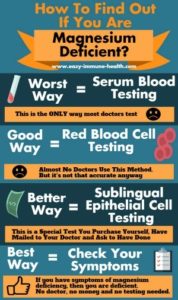Best Way To Test For Magnesium Deficiency
Measuring the levels of magnesium in your body is not as straightforward as you think.
Although you can have a blood test to find this out, read on to discover why this may not be accurate.
As magnesium plays a role in neuromuscular transmission and muscle contraction, it has been hypothesised that magnesium deficiency may lead to muscle cramps.
However, how can you tell when you are magnesium deficient? “Well my Doctor will be able to tell me right…right?”

Unfortunately, the blood test that your doctor usually performs is called a SERUM magnesium test, which is part of any normal blood chemistry panel.
However, this test is not an accurate indicator of your body’s stores of Magnesium, and here’s why.
In order for your heart to beat (and for you to be alive) your body has to maintain a steady amount of magnesium in your blood at all times.
It accomplishes this by pulling magnesium from your bones and tissues as needed, including your muscles.
So you can have a perfectly normal magnesium blood test and be LOW in magnesium in your muscles, which will cause cramps.
Did you know that 99% of the magnesium in the body is in the cells; while only a mere 1% of your the body’s total magnesium is in the blood, making a blood test for magnesium nearly worthless in all but the WORST cases of Magnesium deficiency.
“A serum test for magnesium is actually worse than ineffective, because a test result that is within normal limits lends a false sense of security about the status of the mineral in the body. It also explains why doctors don’t recognize magnesium deficiency; they assume serum magnesium levels are an accurate measure of all the magnesium in the body.”
Dr. Carolyn Dean from – ‘The Magnesium Miracle’
This phenomenon is discussed in the following video by Dr Mark Sircus…
Best Way To Test For Magnesium Deficiency?
There are better tests which can be done, such as ‘RBC Magnesium’ tests (tests the level of magnesium inside of the Red Blood Cells), or a ‘Sublingual epithelial cell’ test (cells are taken from underneath your tongue and checked for magnesium level in the cells).
However, these tests can be expensive, and you need to consider whether you actually need a test at all?
With symptoms of Magnesium deficiency varying from person to person surely the expert on whether you have Magnesium deficiency…is you?
Have you experienced any of the following?
- Constipation
- Hypertension or high blood pressure
- Anxiety
- Depression
- Insomnia
- Fatigue
Or perhaps you already experience some of the following musculoskeletal conditions?
- Muscle Cramps
- Chronic Back Pain
- Magnesium for Migraines
- Muscular Pain
- Tendonitis
- Fibromyalgia
Or how about the following chronic health conditions?
- Heart Disease
- Atrial Fibrillation
- Hypertension or high blood pressure
- Heart Palpitations
- Osteoporosis
- Diabetes
- Sudden Death in patients with Congestive Heart Failure
- Chronic Fatigue Syndrome
- Kidney Stones
Magnesium deficiency has been linked with ALL of the above conditions.
And with less than 30% of U.S. adults consuming the Recommended Daily Allowance (RDA) of magnesium, and nearly 20% getting only half of the magnesium they need daily to remain healthy, it could be there is a strong possibility that many of the symptoms you may experience day to day could be related to a Magnesium deficiency.
This handy infographic from www.easy-immune-health.com breaks down the different ways in which you can find out if you are Magnesium deficient…

So if even the more modern tests for Magnesium deficiency are being generally considered inaccurate, aren’t we better adopting a more preventative approach to the problem of Magnesium deficiency?
Magnesium supplementation is considered generally very safe, and one of the most effective ways to improve your magnesium levels when combined with a healthy diet.
With Magnesium being considered the most important element needed by our bodies after oxygen, water, and basic food, would it not make sense to supplement ourselves now as part of our daily routine, and before we get to the point of experiencing the symptoms and chronic conditions mentioned above?
For more guidance on the best supplements and approaches available for magnesium check out the CureMyCramp.com article on the ‘Best 5 Products To Reduce Cramp’.
Sources
https://www.nps.org.au/medical-info/clinical-topics/news/magnesium-a-treatment-for-leg-cramps
https://www.crampdefense.com/pages/faq
http://www.easy-immune-health.com/magnesium-level.html
http://www.ancient-minerals.com/magnesium-deficiency/need-more/

